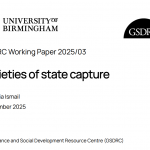Zenobia Ismail Abstract: The literature on state capture is growing and encompasses more countries and contexts. This paper argues that it is time to consider varieties of capture that have different trajectories and outcomes. Two factors, the level of democracy and the strength of institutions, are proposed as starting points for thinking about varieties of capture. Using ...» more
Complexity & systems thinking
Scenario thinking and usage among development actors
Scenario thinking is a strategic planning method that organisations use to make flexible long-term plans. Recent discussions of this method offered by the Foresight Horizon Scanning Centre (2009) define scenario thinking (they refer to it as scenario planning) as ‘a futures technique for medium to long-term strategic analysis and planning used to develop policies and strategies ...» more
Public service reform
The focus in this Pack is on action: on the public service reform intervention, conceived as an exercise in helping. The readings included in this pack have been chosen to be interesting and fresh rather than comprehensive; that is, to stimulate thinking rather than necessarily to ‘cover all the bases’ in public service reform as…» more
Problem-driven iterative approaches and wider governance reform
A problem-driven, iterative approach to institutional reform involves (i) solving defined performance problems through (ii) creating an environment amenable to experimentation, (iii) creating tight feedback loops, and (iv) engaging a broad set of actors. Such an approach has recently been termed as PDIA (problem-driven iterative adaptation), with analysis suggesting that ...» more

